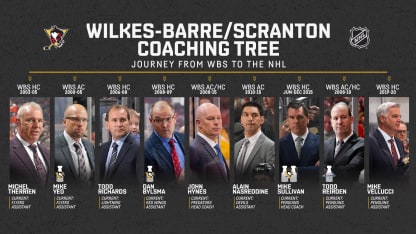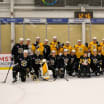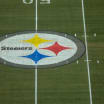Wilkes-Barre/Scranton Has Been a Breeding Ground for NHL Coaches
There are currently nine coaches in the NHL who all spent time with WBS

Amazingly, there are currently nine coaches in the NHL who all spent time with WBS. In addition to Pittsburgh's staff of Mike Sullivan, Todd Reirden and Mike Vellucci, there is Michel Therrien (Philadelphia); Mike Yeo (Philadelphia); Todd Richards (Tampa Bay); Dan Bylsma (Detroit); John Hynes (Nashville); and Alain Nasreddine (New Jersey).
Four of those coaches have won Stanley Cups: Bylsma and Yeo in 2009 with Pittsburgh, Sullivan in 2016 and '17 with Pittsburgh and Reirden in 2018 with Washington.
Seven have gone on from WBS to be NHL head coaches: Sullivan, Reirden, Therrien, Yeo, Richards, Bylsma and Hynes.
"I just think that speaks volumes about the organization," Sullivan said. "I think it's one of the most well-run American Hockey League teams and based on my experience, there's great leadership there with (CEO) Jeff Barrett, (CFO/Executive Vice President) Greg Petorak and the guys that are there day in and day out that run that operation. I think there's great support from our ownership, financial and otherwise. I think the Penguins value the development process and the importance of that, not just with players."
And Sullivan would know. He's spent time with numerous different organizations in the league, starting his post-playing career in 2002 coaching the Providence Bruins for one season before getting promoted to Boston.
From there, Sullivan spent time as an assistant coach with Tampa Bay, the New York Rangers and Vancouver - and then a year on Chicago's player development staff - before getting named head coach of Wilkes-Barre/Scranton on June 18, 2015.
As former associate general manager Jason Botterill was leading the search which ultimately led to Sullivan's hiring, general manager Jim Rutherford told him to make sure that the people on the shortlist had enough experience where they could be a head coach in Pittsburgh.
"When we hire people there, we like them for that position, but we also look beyond that," Rutherford said. "Is there room for growth? Is there room for them to do more than the job they're being hired for? We always talk about that. That was a big part of hiring Mike Sullivan in Wilkes-Barre."
While Sullivan already had professional coaching experience before coming to Wilkes-Barre/Scranton, Reirden did not. He was hired as a WBS assistant coach ahead of the 2008-09 campaign after filling the same role at Bowling Green University the previous season.
But what stood out to Reirden right away was the same thing that stood out to Sullivan: the culture that Barrett has established in his tenure as CEO.
"It's such a great situation down there," Reirden said. "Jeff has just done a phenomenal job down in Wilkes-Barre with what they've built there over the years."
When the Penguins first signed a deal with the city of Wilkes-Barre to be the location for their AHL affiliate back in 1999, Barrett was one of the people assigned to get the project up and running. He has since built WBS into the AHL's model franchise from the ground up with the support of Pittsburgh's ownership in Mario Lemieux and Ron Burkle.
The team plays in a beautiful venue, Mohegan Sun Arena, and has a state-of-the-art facility, The Ice Rink at Coal Street Park - which features a first-class locker room, weight room and players lounge. At almost every game, there is a scout or player development person in the stands.
"We make sure that we treat the players and the coaches like this is an NHL team," Barrett said. "We want them to have every advantage as an NHL coach has."
That makes it an extremely attractive opportunity for coaches. Sullivan said he was thrilled when Botterill first reached out to him, calling WBS "one of the more sought-after positions in the American League."
"Most people in hockey know that the Penguins organization is first-class the way we do things and are willing to give people opportunities," Rutherford said. "And so that would be the first step when somebody is thinking about going to Wilkes-Barre."
At the end of the day, Barrett realizes that the coaches still have to get on a three-hour bus ride to a game versus flying on a private charter. So while they're not quite at the next step yet, the coaches know Barrett and the rest of Penguins management is going to do everything within their power to get them there.
And in the meantime, they are able to grow and develop as coaches through communication with management and learning from talented people.
For J.D. Forrest, who was promoted to WBS head coach on Friday after spending the previous four seasons as WBS assistant coach, the WBS general managers - Jason Botterill, Bill Guerin and Vellucci - were tremendous at giving constant feedback.
"The other part too is that Mike Sullivan and his staff, in whatever interaction we have with them, is so inclusive of the American League staff and of the East Coast League staff," Forrest said. "You get to be around and see how Stanley Cup coaches operate. You pick things up, and then he's open for questions and dialogue."
That goal of advancing people to the next step in their careers also goes for every single person in the organization.
When Barrett first got involved with the WBS project, Craig Patrick was Pittsburgh's general manager at the time. He told Barrett something during the process that informed everything the WBS CEO has done up to this point.
"When I came here in 1999 to start the team, Craig emphasized to me that the role of Wilkes-Barre is to develop assets for the Pittsburgh Penguins," Barrett said. "Assets can be players, assets can be coaches, assets can be hockey ops people, assets can be front office people."
And it shows in who has moved on from WBS in addition to players and coaches. In Pittsburgh alone, goalie coach Mike Buckley, video coach Andy Saucier, assistant video coach Madison Nikkel, assistant equipment manager Paul DeFazio and assistant athletic trainer Patrick Steidle all spent time in WBS.
There's also Guerin, currently general manager of the Minnesota Wild, and Botterill, who was most recently general manager of the Buffalo Sabres, who each filled the role of WBS general manager in addition to their other duties with Pittsburgh before moving onto the next level with other teams.
"When you look at the history of Wilkes-Barre, it's been a breeding ground for growth and development in all different types of hockey operations positions," Sullivan said. "Whether it be coaches, video coaches, equipment guys, medical people, strength and conditioning coaches, right down to the players.
"There are so many different people that have come through Wilkes-Barre and are now are in the National Hockey League, whether it be here in Pittsburgh or otherwise. They're spread out all over the league. It's an indication of how well-run Wilkes-Barre is. It's a first-class operation and it starts with the leadership."
Barrett facilitates that development with the staff by telling every person he hires on the front office side that the goal is to get them to the next step in their careers.
"Everyone that works here knows that," Barrett said. "I tell them that if you're here in five years, you either have a great success story here or I'm disappointed in you because it's time to move on. We're here to try to help everyone get ahead."
The biggest way that Barrett tries to do that is to have an open-door policy with everyone who works there.
"What I do is that I've been in this league long enough that I just try to act as a voice of reason for them," said Barrett, who was the Penguins vice president of ticketing before taking over Wilkes-Barre/Scranton. "I've been through every situation these guys are going to go through in this league. I've been through it all, so I can talk them through it."
Overall, it's such a luxury for Rutherford to have such an excellent development process from top to bottom.
"Certainly the Penguins have probably the best story to tell when you look at how many people have gone through Wilkes-Barre and how many people ended up with the Penguins and throughout the NHL," Rutherford said. "It's really remarkable."


















































